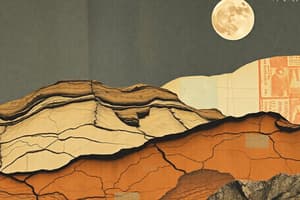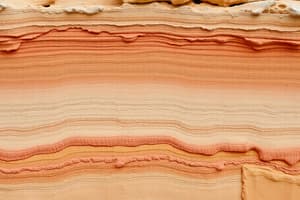Podcast
Questions and Answers
What is the significant role of climatic factors in the process of 'weathering'?
What is the significant role of climatic factors in the process of 'weathering'?
- Forming residual or in situ deposits
- Transporting minerals and rocks to another place
- Shaping the world around us
- Breaking down minerals and rocks (correct)
What is the definition of 'erosion' in the context of geological sciences?
What is the definition of 'erosion' in the context of geological sciences?
- The transportation of eroded materials to another place (correct)
- The breakdown of minerals and rocks due to climatic factors
- The process of removing earth materials from their original place
- The shaping of the world around us by major forces
What does 'residual or in situ deposits' refer to in relation to 'weathering'?
What does 'residual or in situ deposits' refer to in relation to 'weathering'?
- Earth materials transported to another place
- The transportation of eroded materials
- The breakdown of minerals and rocks
- Minerals and rocks remaining in their original place (correct)
Which process comes after 'weathering' and before 'deposition'?
Which process comes after 'weathering' and before 'deposition'?
In the context of geological sciences, what happens after 'weathering' and 'erosion'?
In the context of geological sciences, what happens after 'weathering' and 'erosion'?
What is the primary function of 'erosion' in shaping the land?
What is the primary function of 'erosion' in shaping the land?
Which process contributes to the formation of 'residual or in situ deposits'?
Which process contributes to the formation of 'residual or in situ deposits'?
'Erosion' specifically involves the...
'Erosion' specifically involves the...
'Mass Wasting' is a process that occurs...
'Mass Wasting' is a process that occurs...
'Transportation' is a stage that comes...
'Transportation' is a stage that comes...
What texture characterizes regional metamorphic rocks?
What texture characterizes regional metamorphic rocks?
Which type of rocks are products of solidification of molten material from the earth's depth?
Which type of rocks are products of solidification of molten material from the earth's depth?
What type of rocks are characterized by being coarse-grained and rough?
What type of rocks are characterized by being coarse-grained and rough?
Which type of rock is formed from Lava and is fine-grained and smooth?
Which type of rock is formed from Lava and is fine-grained and smooth?
What represents the start to form new magma when high-grade metamorphic rocks are subjected to more temperature and pressure with increasing depth?
What represents the start to form new magma when high-grade metamorphic rocks are subjected to more temperature and pressure with increasing depth?
What is the source or pre-existing rock for regional metamorphic rocks?
What is the source or pre-existing rock for regional metamorphic rocks?
What is the field of study of GES 111?
What is the field of study of GES 111?
'GES 111 Physical Geology' is powered by which University?
'GES 111 Physical Geology' is powered by which University?
'GES 111 Physical Geology' is instructed by whom?
'GES 111 Physical Geology' is instructed by whom?
'GES 111 Physical Geology' is a course specifically designed for students from which programs?
'GES 111 Physical Geology' is a course specifically designed for students from which programs?
What is the product of the cleavage reaction when dialkyl ethers are heated with strong acids?
What is the product of the cleavage reaction when dialkyl ethers are heated with strong acids?
Which mechanism does a 1° alkyl group tend to undergo in the cleavage reaction of ethers?
Which mechanism does a 1° alkyl group tend to undergo in the cleavage reaction of ethers?
What happens when excess HBr is used in the cleavage reaction of ethers?
What happens when excess HBr is used in the cleavage reaction of ethers?
Which alkyl group tends to undergo SN1 displacement in the cleavage reaction of ethers?
Which alkyl group tends to undergo SN1 displacement in the cleavage reaction of ethers?
What type of reaction can the cleavage of ethers with strong acids proceed by, depending on conditions and ether structure?
What type of reaction can the cleavage of ethers with strong acids proceed by, depending on conditions and ether structure?
What is the IUPAC name for C2H5OC2H5?
What is the IUPAC name for C2H5OC2H5?
Which synthesis method is best suited for a 1° halide?
Which synthesis method is best suited for a 1° halide?
What physical state is methyl ether?
What physical state is methyl ether?
How do ethers compare to isomeric alcohols in terms of boiling point?
How do ethers compare to isomeric alcohols in terms of boiling point?
How do ethers compare to isomeric alcohols in terms of water solubility?
How do ethers compare to isomeric alcohols in terms of water solubility?
Flashcards
Weathering
Weathering
The process of breaking down rocks into smaller pieces.
Erosion
Erosion
The movement of weathered rock or soil.
Residual Deposits
Residual Deposits
Material left behind after weathering.
Mass Wasting
Mass Wasting
Signup and view all the flashcards
Igneous Rocks
Igneous Rocks
Signup and view all the flashcards
Intrusive Igneous Rock
Intrusive Igneous Rock
Signup and view all the flashcards
Extrusive Igneous Rock
Extrusive Igneous Rock
Signup and view all the flashcards
Metamorphic Rocks
Metamorphic Rocks
Signup and view all the flashcards
Regional Metamorphic Rocks
Regional Metamorphic Rocks
Signup and view all the flashcards
SN1
SN1
Signup and view all the flashcards
SN2
SN2
Signup and view all the flashcards
Cleavage Reaction
Cleavage Reaction
Signup and view all the flashcards
Dialkyl Ethers
Dialkyl Ethers
Signup and view all the flashcards
Alkyl Halide
Alkyl Halide
Signup and view all the flashcards
Alcohol
Alcohol
Signup and view all the flashcards
Alkyl Bromides
Alkyl Bromides
Signup and view all the flashcards
Physical Geology
Physical Geology
Signup and view all the flashcards
1° alkyl group
1° alkyl group
Signup and view all the flashcards
3° alkyl group
3° alkyl group
Signup and view all the flashcards
Ethoxyethane
Ethoxyethane
Signup and view all the flashcards
Williamson ether synthesis
Williamson ether synthesis
Signup and view all the flashcards
Methyl ether
Methyl ether
Signup and view all the flashcards
Study Notes
Weathering and Erosion
- Climatic factors play a significant role in the process of weathering.
- Erosion is the removal and transportation of rock or soil particles from one location to another.
- Residual or in situ deposits refer to deposits that remain in their original location after weathering.
- The process that comes after weathering and before deposition is erosion.
- After weathering and erosion, the rocks and soil particles are transported to a new location and deposited.
- The primary function of erosion is to shape the land by removing and transporting rocks and soil particles.
- Weathering contributes to the formation of residual or in situ deposits.
- Erosion specifically involves the removal and transportation of rock or soil particles from one location to another.
- Mass Wasting is a process that occurs when there is a sudden movement of rock or soil down a slope.
- Transportation is a stage that comes after erosion, where the rocks and soil particles are transported to a new location.
Rock Types
- Regional metamorphic rocks have a non-foliated or foliated texture.
- Igneous rocks are products of solidification of molten material from the earth's depth.
- Coarse-grained and rough rocks are characteristic of intrusive igneous rocks.
- Fine-grained and smooth rocks are characteristic of extrusive igneous rocks, which are formed from lava.
Metamorphic Rocks
- High-grade metamorphic rocks subjected to more temperature and pressure with increasing depth can partially melt to form new magma.
- Regional metamorphic rocks originate from pre-existing rocks, such as shale or basalt.
Course Information
- The field of study of GES 111 is Physical Geology.
- GES 111 Physical Geology is powered by the University of Nigeria.
- GES 111 Physical Geology is instructed by Dr. A. O. Eze.
- GES 111 Physical Geology is a course specifically designed for students from the Departments of Geology, Geography, and Environmental Science.
Organic Chemistry
- The product of the cleavage reaction when dialkyl ethers are heated with strong acids is an alkyl halide and an alcohol.
- A 1° alkyl group tends to undergo SN2 displacement in the cleavage reaction of ethers.
- When excess HBr is used in the cleavage reaction of ethers, it leads to the formation of alkyl bromides.
- A 3° alkyl group tends to undergo SN1 displacement in the cleavage reaction of ethers.
- The cleavage of ethers with strong acids can proceed by an SN1 or SN2 mechanism, depending on conditions and ether structure.
- The IUPAC name for C2H5OC2H5 is ethoxyethane.
- The best synthesis method for a 1° halide is the Williamson ether synthesis.
- Methyl ether is a gas at room temperature.
- Ethers have a lower boiling point than isomeric alcohols due to weaker intermolecular forces.
- Ethers are less soluble in water than isomeric alcohols due to weaker hydrogen bonding.
Studying That Suits You
Use AI to generate personalized quizzes and flashcards to suit your learning preferences.




